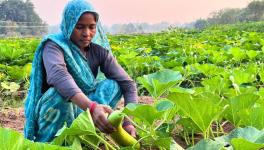Yogi 2.0 First Major Decision: Beneficiaries say no Free Ration in 3 Months
Lucknow: Rameshwar Prasad and his family are dependent on the Yogi Adityanath government’s free ration scheme. However, Prasad, employed under the Mahatma Gandhi National Rural Employment Guarantee Act, hasn’t received the free packets of salt, refined oil, sugar, pulses and chickpeas bearing images of Prime Minister Narendra Modi and Adityanath distributed among the poor ahead of the Assembly election in the last three months.
According to Prasad, more than 60% of the population of Bhardua village, in Chandauli district, which has a majority of Dalits, hasn’t received free ration. “We received free ration only twice after the official announcement. Whenever we enquire with the ration distributor, he cites the shortage of items,” he tells Newsclick.
Around 36 lakh beneficiaries, including Antyodaya cardholders, were getting the double dose of free ration in Chandauli district, Ajay Rai, district head, Mazdoor Kisan Manch, says.
Geeta Rai, who belongs to Chakiya village, narrates the same story. Every time she goes to the ration distributor to get her share of free ration, she returns empty-handed. “We are a family of five. Though the amount of free salt, refined oil, sugar, pulses and chickpeas wasn’t enough for us, it was a kind of relief. The state government promised to distribute free rations till June, we have received it only twice,” she says.
It is believed that the Pradhan Manti Garib Kalyan Anna Yojana, launched during the first wave of the pandemic in 2020, proved to be a game changer in the Assembly election with the poor overwhelmingly voting for the Bharatiya Janata Party (BJP) in the hope of continuing to receive free ration during the pandemic.
From December 2021, along with free food grains, the UP government decided to distribute a litre of refined oil, one kg of pulses, one kg of sugar and a kg of salt to Antyodaya cardholders till march. In the first major decision during Adityanath’s second term, the Cabinet announced that the state would spend Rs 3,270 crore to extend the scheme by three months.
A ration distributor officer requesting anonymity explained the reason for not distributing edible oil. Suppliers want to sell edible oil at the new increased price while the state government wants supplies at the old rates, he told Newsclick.
Apparently, the situation is the same across several districts. Prayagraj has 10,061,38 cardholders—88,106 Antyodaya cardholders plus another 9,72,932 eligible household cardholders—who can avail of the scheme. However, the district supply office says it is trying to restart the distribution of oil by month-end when asked about the lack of distribution.
Sugriv, Amit and Malti, who hail from Gorakhpur, are shooed away by the ration officer with casteist slurs. “Every time we ask for oil, the ration officer, says, ‘The oil doesn’t belong to your father. We will give you when we get the supply.’ Whatever little ration we get, we take and come back,” says Malti.
Rai has a possible explanation for the halt in the distribution of free ration. “The government had probably purchased stock that would last till March, the last month of the scheme. By the time the scheme was extended, the price of edible oil and other items increased. In such a situation, suppliers won’t supply these items at old rates,” he tells Newsclick.
Dipa Sinha, who teaches at the School of Liberal Studies, Ambedkar University, and is actively involved with the Right to Food Campaign terms the distribution of free cooking oil and other items as a “purely election gimmick as it was being distributed only in Uttar Pradesh in the name of the COVID-19 package”.
“The price of oil has reached an astronomical height. The poor need refined oil, pulses and chickpeas the most. The government should, at least, provide them to Antyodaya cardholders till pandemic continues,” Sinha tells Newsclick.
“The production of edible oil in India is low and half of our requirement is imported. Ukraine produced eight percent of sunflower oil globally but imports have been impacted due to the conflict with Russia. Besides, South Asian countries, including Indonesia and Malaysia, have abruptly banned palm oil exports. Palm oil is among the world’s most-used cooking oils and India is dependent on Indonesia,” Sinha adds.
Due to the high price of cooking oil, the poor can afford to “buy only 100 ml or 200 ml. The government should seriously look into the matter and provide them with cooking oil,” Sinha says.
Get the latest reports & analysis with people's perspective on Protests, movements & deep analytical videos, discussions of the current affairs in your Telegram app. Subscribe to NewsClick's Telegram channel & get Real-Time updates on stories, as they get published on our website.























